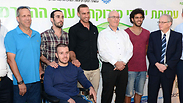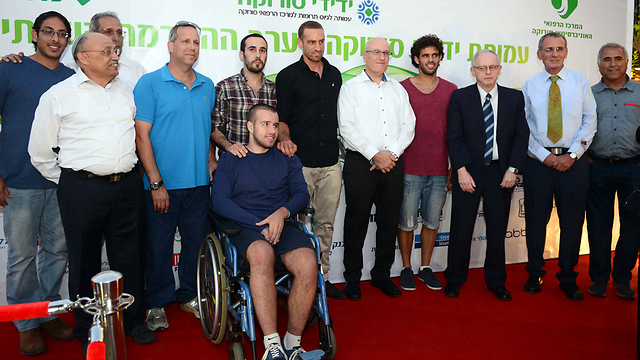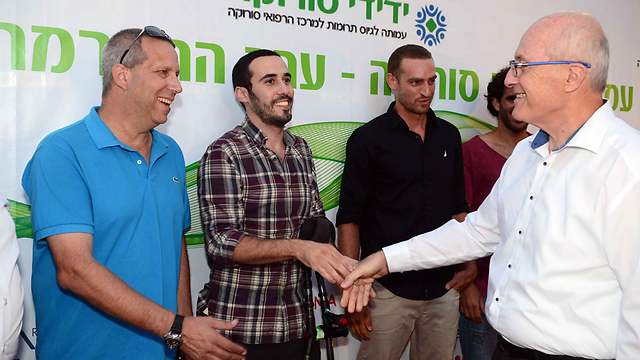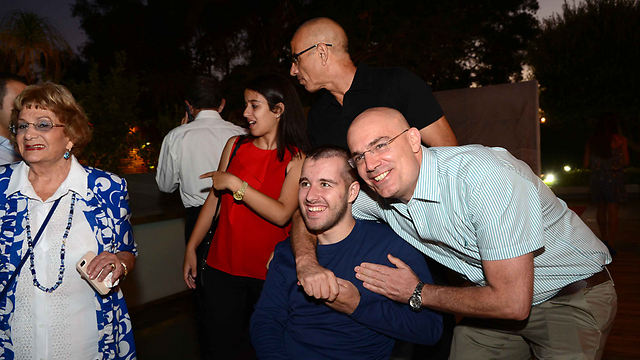
Seriously wounded soldiers from Operation Protective Edge last summer met with the medical staff who treated them at Soroka Medical Center in Be'er Sheva on Sunday, in order to thank them for their extraordinary work in a fundraiser that brought millions in donations.
Among those attending the meeting were Omri Michaeli, who received a citation from the chief of staff, Eshkol's new council head Gadi Yarkoni, who lost both his legs, Ohad Ben-Yishai, who was among the most severely wounded, Noam Dadon and Jean Berman, who was wounded by a mortar shell on his son's birthday while defending his family. The fundraiser held at the meeting has so far gathered 3 million shekels.
Michaeli, 27, of the elite Duvdevan Unit, said, "We protected the country and would not hesitate to do so again."
"We came because we cherish the care we received, the love I received," said Yarkoni. "If this is the least we can do to help then that's what we'll do. The medical staff are wonderful people. I hope the situation will remain safe but relaxed. We live in a place where uncertainty can surprise.
"I'm sure that people at my side were not injured in vain but rather to defend the south and the entire country. We see from each escalation that the rockets have a longer reach. Thanks to these wonderful people we have quiet. Those who must will maintain our security and I, in my new function, will make sure that the settlement of the south is accelerated."
The wounded soldiers said they hope to return to active military duty. "We will not hesitate to return again and put on our uniforms and contribute as much as we can to the fight, despite the injury and suffering," Michaeli said. "It's not something that happened that we regret. We are at peace with what we did and we came to give thanks for all the care and warmth and love."
Noam Dadon, 27, was wounded in the incident that also injured Michaeli. "Since the injury I've been in long-term rehabilitation for almost a year, and it is expected that this will continue for quite a long time," he said.
"I received warmth and love from the entire nation that gave me a lot of strength. Before we fought with weapons, now it's a war to get back to a normal life. I really want to go back to my position. I was in a company commander course. I want to finish it and get a company. That is my dream."
One of the most emotional encounters was that of Ohad Ben-Yishai, who arrived in a wheelchair, full of smiles. "We are very moved," his father Shimon said. "We are meeting the people who were at our side a year ago. It is moving to remember where we were then and where we are now. It fills me with so much appreciation and gratitude. If they were not there, we would not be here. It reminds us of what we went through over the last year."
Amit Frenkel, senior physician in the intensive care department said: "For us, the Soroka team, to hear such a melodius ensemble, considering last summer's thunder, is a unique experience. The added value is to see these unforgettable smiling eyes. This is an extraordinary experience."
Prof. Eyal Sheiner, deputy director of the hospital, who accompanied the Ben-Yishai family all along, was moved at the sight of Ben-Yishai's condition. "It's unbelievable. It's been one year now, and it brings us back with a "boom" back to a difficult period. It's really coming full circle. This is a victory of the spirit. One needs to think about where Ohad was a year ago and where he is today. He still has a long way to go. But it's amazing," said Prof. Sheiner.
During Operation Protective Edge, Soroka Medical Center was on the frontline of treating the injured. It treated most of the soldiers wounded during the operation. In 50 days of fighting, 1,263 wounded were treated, including 777 soldiers and 486 civilians. Fifty-three were severely injured and 40 moderately injured..
The meeting was hosted by the association Friends of Soroka, in order to raise funds for the expansion of the emergency and trauma units in Kibbutz Mishmar HaNegev. In light of natural population growth, the IDF's move to the south, the aging of the population and an expected increase in the number of patients and as part of the hospital's master plan, it is necessary to expand the emergency room and trauma center so that they can properly address the needs of the coming years.



















